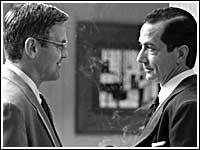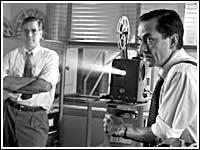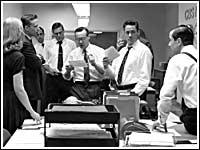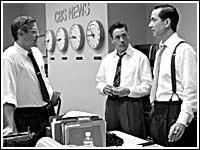 Cinema is, in essence, the art of lying. Casting shadows through light, the fabulous storytelling medium has perpetually specialised in falsehood. Whether it be by exaggeration or exclusion, blatant disregard or bias, lack of care or of capability, cinema has always struggled with the seemingly basic task of reporting the truth. It's the catch-22 a journalist often faces, in the search for objective ground instead of editorialising a story.
Cinema is, in essence, the art of lying. Casting shadows through light, the fabulous storytelling medium has perpetually specialised in falsehood. Whether it be by exaggeration or exclusion, blatant disregard or bias, lack of care or of capability, cinema has always struggled with the seemingly basic task of reporting the truth. It's the catch-22 a journalist often faces, in the search for objective ground instead of editorialising a story.
A newsman's job is to report the facts as they happen, but sometimes, typing out social commentary an always-vital role is simply not enough.
Edward R Murrow, the iconic American broadcast journalist, understood this only too well. First carving a name for himself with his unforgettable wartime broadcasts from London, the radio legend became, in the fifties, one of the most trusted faces of American television with his clipped-on weekly news segments consisting of incisive in-depth coverage of crucial affairs. With his producer and ally, Fred Friendly, the pioneer conquered many a broadcast journalism milestone. But no career highlight was bigger than his public battle with Senator Joseph McCarthy.
![]()
More on rediff.com!
![]()
![]()
![]()
![]()
How the Academy works![]()
Predict the Oscar winners![]()
Syriana rocks, but Clooney?![]()
![]()
![]()
George Clooney's astonishing Good Night, And Good Luck, focusses on this media versus state face-off with unapologetic candour. The film, decidedly not a biopic, tells us not of Murrow's life and times, nor does it delve into the beginnings of McCarthy's communist witch hunt. As you settle into the glorious black and white frames marking out this all-too-relevant tale from recent history, you're told the simple facts: McCarthy was ransacking America in an outlandish, fascist attempt to cleanse it of 'card carrying' Communists.
The film opens with dinner at the RTNDA (Radio-Television News Directors Association) Convention in 1958, where Murrow is being felicitated. Calm, yet almost imperceptibly terse, Murrow (David Strathairn) clears his throat and launches into his speech, the script borrowing loyally -- enough to sound almost verbatim -- from the original. And this is where the film's genius lies: it is an inspirationally true-to-life motion picture, a fictionalised retelling that treads in documentary waters, a movie that doesn't bastardise fact, just reports it.
 Clooney, as a director, shows marvellous restraint. In writing this film with producer Grant Heslov, the actors have not tried to bring out what did not exist, nor have they attempted to dramatise the unknown. This is a film strictly in the territory of fact, an authentic newsroom drama reported with conviction. Most of Murrow's show has been recreated to echo the original archival footage, leading the way for the directorial masterstroke: deciding it would be near-impossible for an actor to play the reviled Senator without facing accusations of overplaying his monstrosity, he uses actual newsreel footage of the man, resultantly further blurring the little hyphen between docu-drama.
Clooney, as a director, shows marvellous restraint. In writing this film with producer Grant Heslov, the actors have not tried to bring out what did not exist, nor have they attempted to dramatise the unknown. This is a film strictly in the territory of fact, an authentic newsroom drama reported with conviction. Most of Murrow's show has been recreated to echo the original archival footage, leading the way for the directorial masterstroke: deciding it would be near-impossible for an actor to play the reviled Senator without facing accusations of overplaying his monstrosity, he uses actual newsreel footage of the man, resultantly further blurring the little hyphen between docu-drama.
Do not be fooled, however. Despite all the assertions of fact, this remains a motion picture, and a gorgeous one at that. Cinematographer Robert Elswit's superlative camera poetically leaps through claustrophobic television studios, jazz singers, and CBS office waiting rooms with lyrical ease and perfect economy. In this 93-minute film, not a frame is wasted as the action continues relentlessly, the fascinating visuals and startling ensemble cast (Frank Langella plays CBS head William Paley unforgettably; Patricia Clarkson, Robert Downey Jr, and Ray Wise perform their crucial roles with great efficiency) just making sure you're absorbed in this extremely dialogue-driven film.
David Strathairn does not resemble Edward R Murrow much, but physical mimicry was never the question here. With this portrayal, subtle beyond belief, the actor has achieved the kind of performance that is, if we're very lucky, glimpsed once every few years.
Nominee Focus: David Strathairn
 Moments before his broadcast, he sits rapt in concentration, wrapped in a self-created bubble of perpetually present cigarette smoke. His producer taps him on the leg with a pen as the 'on air' light flashes on, and he instantly switches to his iconic persona, voicing dissent and quoting Shakespeare while at it. Strathairn inhabits the Murrow character to a fault, from his smile-suppressing to his awesome voice, and ends up balancing a teensy tightrope and bounding through an impossible act all we can do is look up at him and applaud.
Moments before his broadcast, he sits rapt in concentration, wrapped in a self-created bubble of perpetually present cigarette smoke. His producer taps him on the leg with a pen as the 'on air' light flashes on, and he instantly switches to his iconic persona, voicing dissent and quoting Shakespeare while at it. Strathairn inhabits the Murrow character to a fault, from his smile-suppressing to his awesome voice, and ends up balancing a teensy tightrope and bounding through an impossible act all we can do is look up at him and applaud.
Clooney himself plays Fred Friendly, the good-natured everyman producer who doesn't budge from Murrow's side. Fiercely loyal and constantly uncompromising, Friendly emphasises the need for absolute separation between church and state: between commerce and editorial. When Murrow airs his See It Now special on Senator Joseph McCarthy, CBS loses sponsors. Murrow declares, without consultation, that he and Friendly will split the advertising costs; Friendly's kids will just have to go without Christmas presents that year. When reminded that Friendly's a Jew, Murrow doesn't bat an eyelid. "Well, don't tell him that. He loves Christmas."
Senator Joseph McCarthy Murrow would have doubtless interrupted here and suggested he be referred to as Junior Senator was a frightening man, a suddenly powerful monolith who believed in absolutes, and trumped Communism charges against all who opposed him. That his great battle would be with a television journalist sounded (and still sounds) ludicrous and laughable, but the film provides us ringside seats for a compelling bout. The archival footage makes it disconcertingly real, and facilitates our transportation into that era.
 The film is a deeply serious one, but consists of deft touches of wit and tremendously poignant subplots. CBS policy forces a couple of reporters to keep their marriage a secret, yet the fact that everyone in office can see through their sham isn't enough to get them into trouble, even as the threat looms. Murrow's colleague, Don Hollenbeck, is turned into a wreck because of constant persecution from a savage columnist. And Murrow's happiest sponsors are Kent Cigarettes, because the newscaster and his team smoke them with alarming abandon. Murrow himself died of lung cancer at 57, almost out of choice, but he had made enough of a difference by then.
The film is a deeply serious one, but consists of deft touches of wit and tremendously poignant subplots. CBS policy forces a couple of reporters to keep their marriage a secret, yet the fact that everyone in office can see through their sham isn't enough to get them into trouble, even as the threat looms. Murrow's colleague, Don Hollenbeck, is turned into a wreck because of constant persecution from a savage columnist. And Murrow's happiest sponsors are Kent Cigarettes, because the newscaster and his team smoke them with alarming abandon. Murrow himself died of lung cancer at 57, almost out of choice, but he had made enough of a difference by then.
Good Night, And Good Luck, taking its title from Murrow's nightly sign-off, is a film about a crusade for justice, yet skilfully avoids the pitfall of preaching. The story is dated perfectly and completely in the 1950s, yet the subjects terrorism threats, persecution of the innocents, the importance of the media, responsible journalism all hit home in our present political climate, all over the world. Murrow believed there was an audience for the truth, and without it television was just a box with wires and lights.
George Clooney, now wearing well the directorial necktie, has given us a throwback to classic journalism; to Frank Capra; to a time when newspapermen dressed in shirts and ties; to a time with hope for the future. It is also the kind of motion picture one of the finest recent films about journalism that rekindles hope in an increasingly cynical time.
Recommended reading:
Edward R Murrow's keynote speech at the RTNTDA Convention, 1958
See It Now transcript: A report on Senator Joseph R McCarthy







